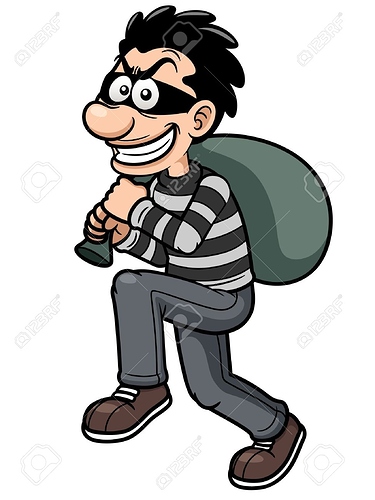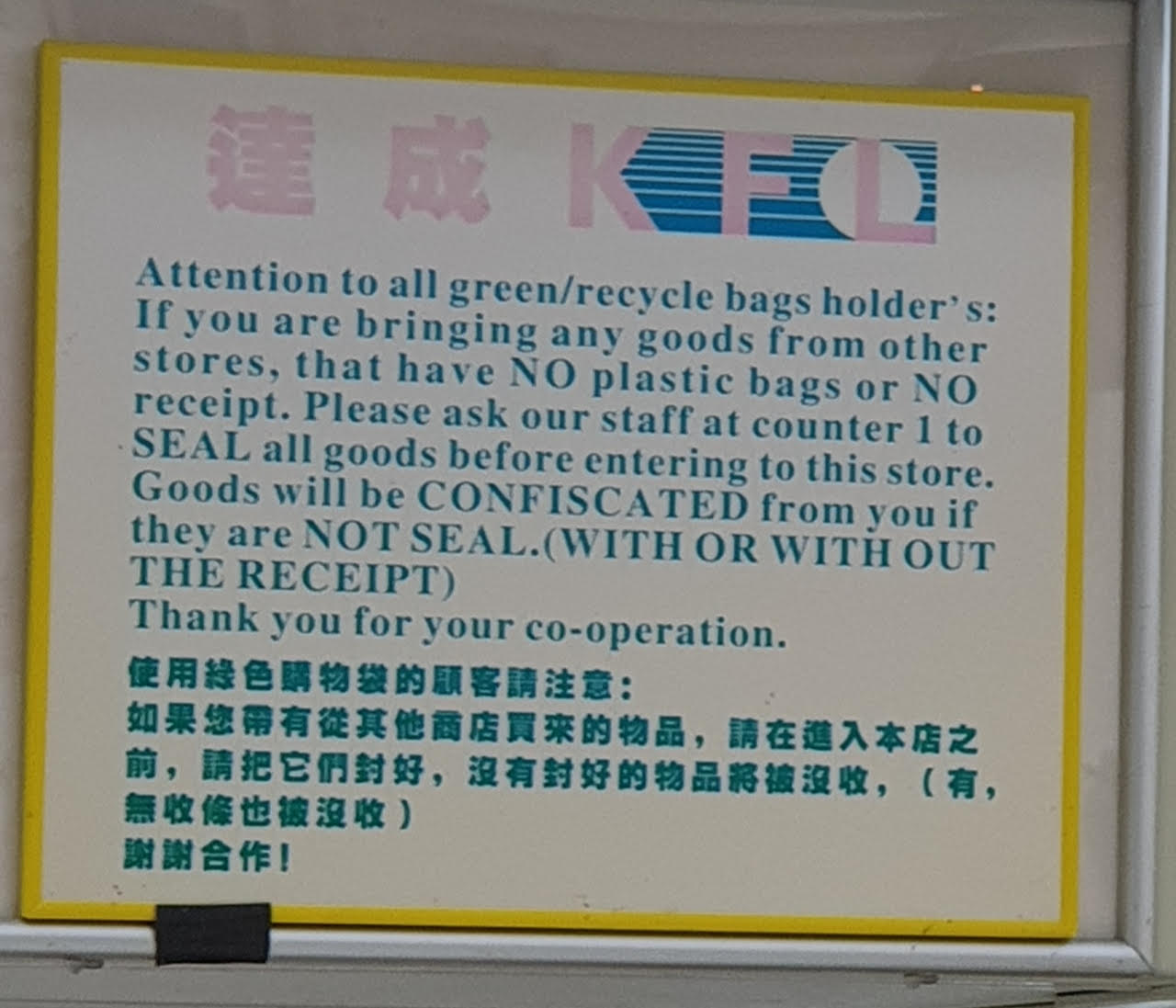If I’m leaving a shop with a bag, I’ll offer it for inspection (assuming there’s someone around to offer it to). It’s just courtesy.
It occurred to me today there is an aspect of bag checking that wasn’t discussed anywhere in this thread. The wellbeing of staff.
In most major supermarkets and lots of chain stores, ordinary staff are responsible for checking bags rather than a trained security guard. This is a problem as:
- There’s no guarantee they’ve received training in what they can and can’t legally do, making them vulnerable to getting into legal trouble
- They are put at risk when customers who are up to no good become violent or threatening and have no self defense training or equipment
- They’re not being paid sufficiently for that duty as security receive a higher pay under standard awards
- It puts them under far more pressure than a casual sales assistant should be under, especially when people refuse or become irritated at inspections. No one wants to feel like they’re stuffing up their job!
With that in mind does anyone respond differently if it’s a security person asking to check their bag vs a regular staff member?
No - both have no more or less authority than any normal non-LEO person. I think it’s fair to be about attitude, with the customer the mirror …
I find staff members usually apologetic and non-threatening. When a uniformed ‘security officer’ does it I find it intimidating rather than businesslike but dependant on the demeanour of the security person. If ‘he’ comes with ‘authority’ it puts me off big time. If ‘he’ comes with ‘it is my job, may I’ or ‘humility’ I have no problem.
I have nothing to hide so always happy to stop to allow an inspection of my bag and hopefully set a good example for people coming behind. If everyone starts refusing an inspection the real shoplifters will be emboldened and the consumer will suffer in the end with higher prices.
I agree, just sometimes you might have something in your bag that you don’t want to share with strangers - perhaps prescription drugs for mental illness, saucy underwear, a DVD of The Breakfast Club etc. It’s good to be clear on where you stand legally.
The cost of theft from stores is passed on to the customer so it is in our interest financially to help them handle it better, whatever we may personally believe should happen at the checkout.
The store should take on this conundrum with the thief, not the customer.
This is about evidence.
If there is evidence of me being a thief, treat me as a suspect. If there is no evidence don’t expect to look through my stuff, hoping to find some.
Interesting point, but with a store as large as Bunnings, it would be relatively easy to slip something into a bag without anyone seeing it (including those watching cameras as they would need one set if eyes on every customer to confirm that something has occurred and therefore a bag search is warranted).
The other point is what does a ‘thief’ look like. I am yet to see a stereotypic profile of a thief, except possibly one like this,
and how does the store attendant know if you are a thief of not, by just looking at you. Does anyone fit the profile of a thief, especially when some well known and respected citizens have been caught out concealing items and leaving a retail store without payment?
If everyone was honest and trustworthy, then there would be no need for bag checks.
It is easy to find who is responsible for these bag checks, it is those who do try and steal and give the rest of us a bad name. This is why retailers adopt blanket policies/entry codes of checking everyone who leaves.
You don’t want to allow any evidence to be collected so no bags will ever be inspected unless the shoplifter is caught pocketing goods or wears a Beagle Boys mask.
We’ve just received this picture of a sign displayed in a Melbourne store. The sender nominated the sign/store policy for a shonky award, questioning whether or not shops have the right to confiscate customer’s belongings. What do you think? Or have you seen anything like this before?
No. But it certainly deserves a shonky and a referral to the appropiate authority.
![]()
No, they don’t. Definitely shonky - and what method of sealing the bag are they using that does not damage the bag and is easy for the customer to remove? The store might want to have their door staff familiarise themselves with the excellent articles CHOICE has published on private health cover ![]()
While this is as over the top as I have seen, ‘Seal all goods’ might be ESL for applying a small stick-on tag. Even Bunnings has done that when I take some things in and want it known I brought it in with me.
Definitely some dodgy behaviour going on there. Always use common sense though. When I worked in retail people would frequently bring in something they were returning, walk around the whole store with it then walk up the front and ask for a refund. They do realise how that looks right?
It’s unique in our shopping experience.
More than shonky when you compare the wording with the prior advice re inspection of shopping bags.
I have seen advice some time back concerning store owners requiring customers to leave bags at the front door.
It would be tempting to consider the first line of the sign literally.
The advice apparently only applies to “green/recycle bag holders”.
The slightly awkward wording and obvious exception suggests a general lack of understanding of legal reality by the signs creator. Perhaps the Chinese character form is more concise and we are reading the English translation?
Yes, our local green grocer/independent supermarket has a similar policy…it says something like…If you bring food into our shop and don’t have a receipt, you will be charged the shelf price our the same product in our store when you leave.
I understand speaking to the owner they have had problems with customers consuming store products (cold drinks, snack foods, chocolate bars etc) and then claiming when they are leaving that they bought the item elsewhere and therefore not going to pay for it.
Looking at the KFL sign it is in similar vein…maybe not worded all that well though.
If one takes an items available in the store and does not have a receipt for it, the store can possibly only assume that it is from the store as the customer can’t prove otherwise. If this was not the case, then anything in a bag it could be argued was from somewhere else (even if it wasn’t) and one was not going to pay for it.
I also understand that Bunnings now stamp receipts for a similar reason…they have had customers leave the store with an item, then return immediately to take (steal) another item out of the store using the same receipt and then either take the item back for a refund or in effect get 2+ for the price of one.
Unfortunately a few who think society/businesses owe them something and think it is okay to steal. However, doing such affects everyone else as well as retailers try and protect themselves against theft.
I experienced a classic yesterday at our local Coles after I checked my receipt and noticed that a pack of crisps that I thought was $3.50 was charged at $4.40.
I went back and checked the shelf sign which was 2 for $7.00 so I grabbed another packet and I said to the staff member supervising the self-serve checkouts that I wanted to get a refund for 1 packet and pay for 2 packets.
She replied that I would have to go to the front counter which I did, and when the one person who was running the express checkout, selling tobacco products, and attending to customer queries got to serving me, I explained what I wanted.
She told me I should not have left the checkout without paying for the item as they have security and I could have been accused of shoplifting, to which I pointed out that I was just following the other employee’s instructions.
She was going to speak to the other employee about the matter.
On the other hand, when I was there last week, I noticed a strip of banana peel on the floor in front of the banana display stand, and as I kicked it safely under the stand, I saw the rest of the peel amongst the bananas minus its contents.
Some grub had not only stolen the banana but left the peel on the floor for someone to slip on.
![]()
It wasn’t Woollies was it, as it may not have been stolen. The consumer of the banana should however disposed of it appropriately.
I can imagine that once the dropped sausage police hear of this one, they might be out to have bananas banned.
I have always assumed (perhaps wrongly) that it is safe to bring a newly purchased product in if you know that it is not sold in the second store. That could be taken to be implicit in what you quote. For example, if it’s a home brand product or a fake brand home brand product, you should be safe, but it is not something that I have ever tested.
Having a receipt is not the be all and end all because it is not difficult to pick up a valid receipt e.g. recent customer tossed receipt on floor, left in trolley, did not collect and it ended up attached to your own receipt.
Yes, if they only sell say Pepsi and you have a Coke, then it shouldn’t be an issue…but how does one know that the store doesn’t sell Coke until they actually enter the store (unless they are familiar with the store and possibly entered immediately before the purchase of the Coke to find out they didn’t stock them…and then returned to buy something else). One of life’s dilemmas and why a receipt would be advisable.

